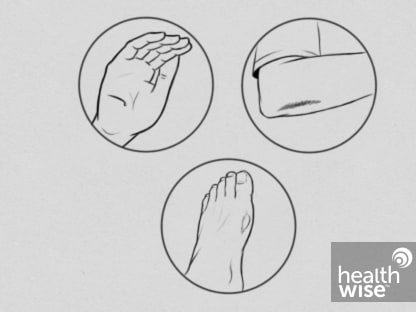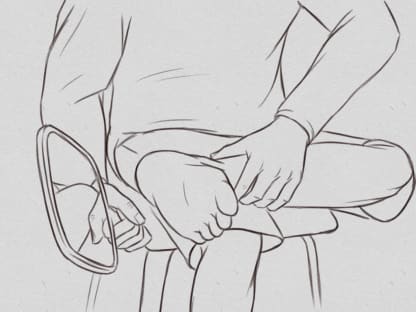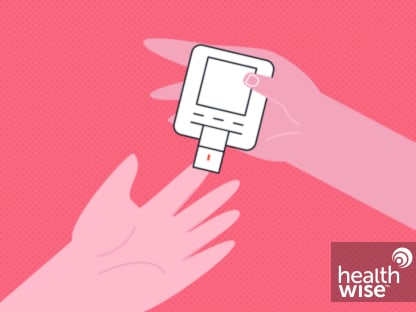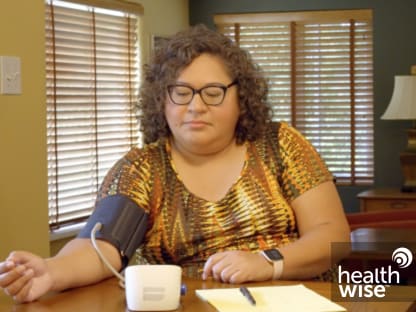Diabetic Neuropathy
Condition Basics
What is diabetic neuropathy?
Diabetic neuropathy is nerve damage caused by diabetes. Over time, high blood sugar levels can damage nerves throughout your body.
There are several types.
- Peripheral neuropathy. This is damage to peripheral nerves. They sense pain, touch, hot, and cold. They also affect movement and muscle strength. The nerves in the feet and lower legs are most often affected. The damage can get worse with time.
- Autonomic neuropathy. This is damage to autonomic nerves. They control things like your heartbeat and blood pressure. They also control digestion, urination, and sexual function.
- Atypical neuropathies. One type affects just one nerve. It's called mononeuropathy. It often affects a nerve in the wrist or foot. It can also affect a nerve that controls eye muscles. Another type affects many nerves. It's called polyradiculoneuropathy. It often affects nerves in the back and chest. These types of nerve damage happen all of a sudden. They can get better with time.
What causes it?
Over time, high blood sugar levels from diabetes can damage nerves throughout your body. The higher your blood sugar levels, the more likely you are to have nerve damage. Also, the older you get and the longer you have diabetes, the more likely you are to have nerve damage.
What are the symptoms?
Symptoms depend on which nerves are injured. You may have burning or shooting pain in your arms and legs. Or you may not be able to feel pain, especially in your feet. This can lead to serious infections if sores aren't treated. Other symptoms may include problems with digestion, urination, and blood vessels.
How is it diagnosed?
Your doctor will do a physical exam. They will ask about your health and current symptoms, including how well you can feel light touch, temperature, vibration, and movement. You'll also be asked about any symptoms such as pain, weakness, or urinary or digestive problems. You may need a nerve test for a diagnosis.
How is diabetic neuropathy treated?
Treatment involves keeping blood sugar levels in your target range. This will not cure the nerve damage, but it can help keep the damage from getting worse, and the pain might get better. Other treatments, such as medicines for pain or digestive problems, depend on your symptoms.
Health Tools
Health Tools help you make wise health decisions or take action to improve your health.
Cause
Over time, high blood sugar levels from diabetes can damage nerves throughout your body. The higher your blood sugar levels, the more likely you are to have nerve damage.
Also, the older you get and the longer you have diabetes, the more likely you are to have nerve damage. Having high blood pressure and high cholesterol can also increase your risk of having diabetic neuropathy.
Symptoms
Peripheral neuropathy
Symptoms of peripheral neuropathy can occur slowly over time. The most common ones are:
- Numbness, tightness, and tingling, especially in the legs, hands, and feet.
- Loss of feeling.
- Burning, shooting, or stabbing pain in the legs, hands, and feet. Often the pain is worse at night.
- Weakness and loss of balance.
Autonomic neuropathy
Autonomic neuropathy may affect certain processes in the body. This includes digestion, urination, sexual function, your body's ability to regulate temperature, and heart and blood vessel function, including blood pressure. Symptoms may include:
- Dizziness, weakness, or fainting when you stand or sit up from a reclining position.
- Feeling full after only a few bites of food, bloating, constipation, heartburn, nausea and vomiting, and belly pain. These symptoms may be a sign of gastroparesis. This causes the stomach to empty much slower than normal.
- Trouble sensing when your bladder is full or problems emptying your bladder completely.
- Sexual problems, such as erection problems or vaginal dryness.
- Trouble knowing when your blood sugar is low.
- Extreme sweating of the torso, face, or neck at night or while eating certain foods, such as spicy foods. Some people may have reduced sweating, especially in their feet and legs.
Atypical neuropathies
The type of symptoms you have depends on the kind of atypical neuropathy you have.
Mononeuropathy can cause:
- Pain in a single, limited area of the body. This may be in the wrist or foot.
- Pain in and around one of the eyes, trouble moving the eyes, and double vision. This occurs when one of the cranial nerves is affected.
Polyradiculoneuropathy can cause:
- Pain that occurs in a band-shaped area around the chest or belly.
- Weakness and pain in the lower back. It often goes down to the thigh (femoral neuropathy).
These symptoms may be caused by other serious conditions. See your doctor right away if you have any of these symptoms.
Learn more
Exams and Tests
During a physical exam, your doctor may check how well you can feel light touch, temperature, pain, vibration, and movement. Your doctor may also check your strength and reflexes. Tests such as an electromyogram and nerve conduction studies may be done to confirm the diagnosis. You may need other tests to see which type of neuropathy you have and to help guide your treatment.
Doctors can't test for all types of nerve damage. So it's important to tell your doctor about any pain or weakness you feel. Also mention heavy sweating or dizziness and any changes in digestion, urination, and sexual function.
Learn more
Treatment Overview
Treatment involves keeping blood sugar levels in your target range. This will not cure nerve damage. But it can help keep the damage from getting worse, and the pain might get better.
Other treatments depend on your symptoms. They may include:
- Medicines to treat pain, digestive problems, or blood vessel problems.
- Medicines or the use of compression stockings to treat blood pressure problems.
- Treatment for foot sores or injuries to prevent ulcers or serious infections.
- Treatments for sexual problems. Medicines or devices may help improve erections. Or lubricating creams may help vaginal dryness.
- A splint or brace to help treat a nerve problem.
- Testing and treatment for bladder problems.
When you have diabetes, you may not notice foot problems. So check your feet every day. An untreated problem on your foot can lead to a serious infection or even amputation.
Work together with your doctor to find the treatment that helps you the most.
Learn more
Self-Care
- Take your medicines exactly as prescribed. Call your doctor if you think you are having a problem with your medicine.
- Try to keep blood sugar in your target range.
- Follow your meal plan to know how much carbohydrate you need for meals and snacks. A registered dietitian or diabetes educator can help you plan meals.
- Try to get at least 30 minutes of exercise on most days.
- Check your blood sugar as many times each day as your doctor recommends.
- Take and record your blood pressure at home if your doctor tells you to. To take your blood pressure at home:
- Ask your doctor to check your blood pressure monitor to be sure it is accurate and the cuff fits you. Also ask your doctor to watch you to make sure that you are using it right.
- Do not use medicine known to raise blood pressure (such as some nasal decongestant sprays) before taking your blood pressure.
- Avoid taking your blood pressure if you have just exercised or are nervous or upset. Rest at least 15 minutes before you take a reading.
- If you smoke, quit or cut back as much as you can. Smoking can increase your risk for peripheral artery disease (PAD). PAD can make neuropathy worse. If you need help quitting, talk to your doctor about stop-smoking programs and medicines. These can increase your chances of quitting for good.
- Limit alcohol to 2 drinks a day for men and 1 drink a day for women. Too much alcohol can cause health problems.
To care for your feet
- Prevent injury by wearing shoes at all times, even when you are indoors.
- Do foot care as part of your daily routine. Wash your feet and then rub lotion on your feet, but not between your toes. Use a handheld mirror or magnifying mirror to inspect your feet for blisters, cuts, cracks, or sores.
- Have your toenails trimmed and filed straight across.
- Wear shoes and socks that fit well. Soft shoes that have good support and that fit well (such as tennis shoes) are best for your feet.
- Check your shoes for any loose objects or rough edges before you put them on.
- Ask your doctor to check your feet during each visit. Your doctor may notice a foot problem you have missed.
- Get early treatment for any foot problem, even a minor one.
Learn more
Watch
Related Information
Credits
Current as of: July 7, 2025
Author: Ignite Healthwise, LLC Staff
Clinical Review Board
All Ignite Healthwise, LLC education is reviewed by a team that includes physicians, nurses, advanced practitioners, registered dieticians, and other healthcare professionals.
Current as of: July 7, 2025
Author: Ignite Healthwise, LLC Staff
Clinical Review Board
All Ignite Healthwise, LLC education is reviewed by a team that includes physicians, nurses, advanced practitioners, registered dieticians, and other healthcare professionals.











